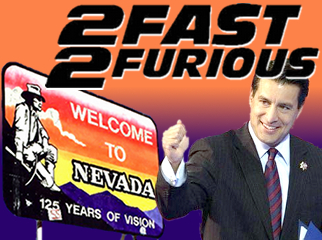 UPDATE: Gov. Sandoval signed the bill into law late Thursday afternoon, officially making Nevada the first state to approve interstate gambling.
UPDATE: Gov. Sandoval signed the bill into law late Thursday afternoon, officially making Nevada the first state to approve interstate gambling.
Nevada moved one step closer to allowing interstate compacts for online poker after the state legislature fast-tracked the necessary bill through both state houses on Thursday. The pols dubbed the the relevant amendment an ’emergency measure,’ assuring its swift passage and leaving only Gov. Brian Sandoval‘s signature to make it law. Appearing before a joint session of the state Assembly and Senate Judiciary committee earlier on Thursday, Sandoval (pictured right) said it was “vital” they approve the amendments to the state’s interactive gaming legislation so that Nevada could keep pace with New Jersey’s online gambling efforts. Sandoval is expected to sign the bill later today, less than six hours after appearing before the committee. Whoever said the wheels of government turn slowly?
It was just last week that Assembly Majority Leader William Horne introduced the AB 114 amendment, which, in addition to permitting interstate compacts, proposed doubling online poker license and renewal fees, provisions that Sandoval indicated he could not support. A compromise was struck that kept the initial license fee at its original $500k sticker price, but the Gaming Commission will have the option of amending that fee as high as $1m or as low as $150k if they determine the fee “is not competitive with fees charged in other jurisdictions” or “the low number of applicants demonstrates that the fee is too high,” or is necessary “because of conditions associated with entering into” compacts with other states. The renewal fees will remain at their original $250k, but the Commission has the option to raise this to $500k or lower it to $75k.
AB 114 was also amended to reduce the freezeout period for ‘bad actors’ and ‘covered assets’ – companies that served US customers after Dec. 31, 2006, the individuals who worked for these companies and their software – from 10 years to five. Horne called this compromise the difference between a “Pete Rose” and “single game suspension” punishment. So, there you have it, PokerStars… Your induction into the Nevada Gaming Hall of Fame isn’t completely off the table.
Despite claims made just the day before by American Gaming Association (AGA) CEO Frank Fahrenkopf that the next few months could see a new federal online poker bill introduced in the House of Representatives (possibly another effort from Texas Republican Joe Barton), Sandoval told the committee that Nevada “cannot wait any longer for Congress to act.” Senate Majority Leader Harry Reid (D-NV), whose most recent attempt to get federal online poker legislation through Congress went out with a whimper in December, told the Las Vegas Sun he understood Nevada’s state-level plans. “Nevada doesn’t have a choice unless the federal government does something. I don’t blame them. We should’ve done it on a federal level. There’s a lot of reasons we didn’t.”
Even absent federal okay, Sandoval testified that Nevada was in “good legal standing” to enter into compacts with other states that pass similar legislation. Sandoval clarified that while Nevada’s legislation refers to “interactive gaming,” he believed interstate compacts involving anything other than online poker would raise federal ire. Horne said the onus was now on gaming regulators to tailor the language of these compacts so that Nevada’s regulatory experience will be “part of the selling point to jurisdictions that don’t have” that experience. Nevada Resort Association lobbyist Pete Ernaut painted the quid pro quo in more stark terms: “We have the most mature regulatory infrastructure … and [other states] have the players.” Horne testified that Nevada has yet to initiate any discussions on compacts with other states.
Speaking of other states, New Jersey isn’t letting the grass grow under its feet. The state Assembly has set a Feb. 26 date for voting on an amended iGaming bill that corresponds to the conditions set out in Gov. Chris Christie’s conditional veto. The state Senate is expected to hold its own vote shortly thereafter. Unlike Nevada, New Jersey expunged most of the ‘bad actors’ language from its legislation, meaning PokerStars would theoretically be eligible for a license and states that entered into compacts with New Jersey could share PokerStars’ liquidity.






